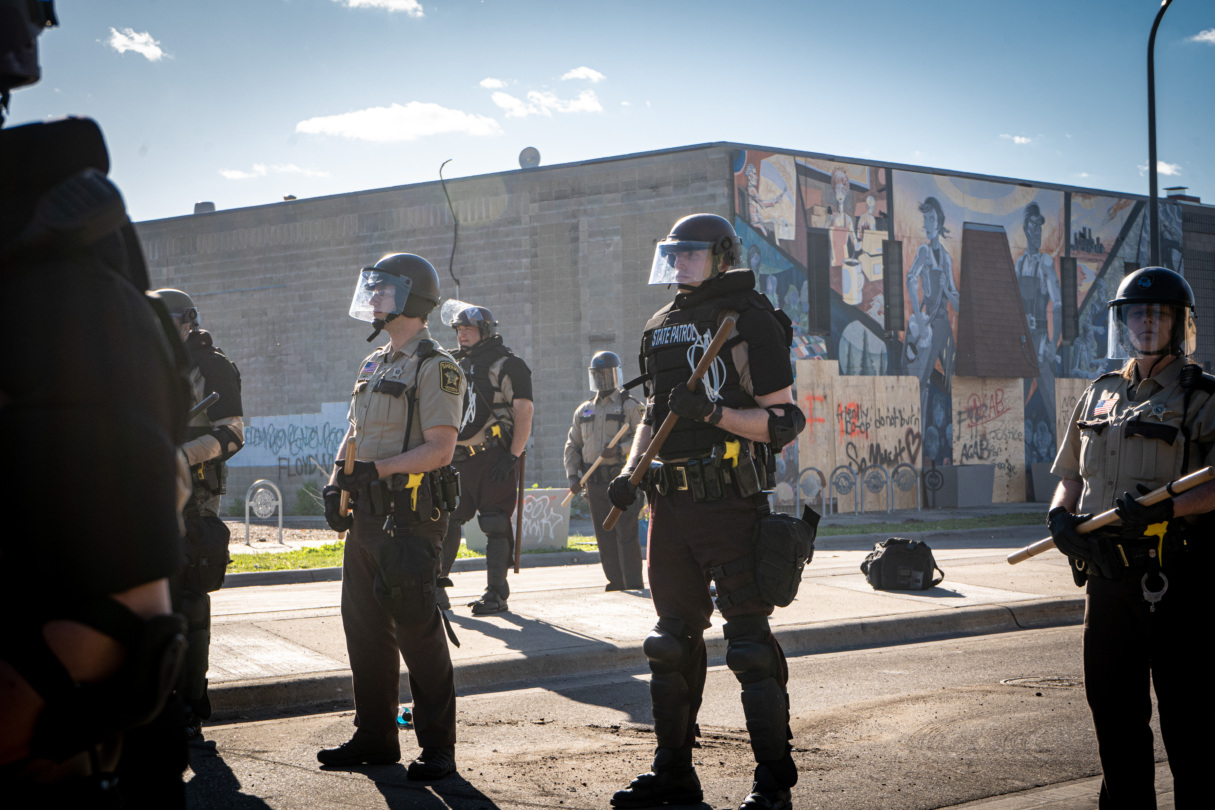
More Info
State patrol police officers standing guard during Minneapolis protests about the police killing of George Floyd on May 29, 2020.
MUNSHOTS / Shutterfly
The First Amendment protects reporters, too
As a former Reuters correspondent in Chicago, I often reported on excessive force by law enforcement, including the deaths of Black people and the ensuing protests. The awful, unjust events of recent weeks and months — the killings of George Floyd, Breonna Taylor, and Ahmaud Arbery, and the racism faced by the Central Park birder — unfortunately did not surprise me.
But last week, as I watched — outraged — video of live coverage of CNN reporter Omar Jimenez’s arrest, I found myself asking out loud: “Why?”
Jimenez also is a journalist of color. He had properly identified himself as a member of the media while covering protests in Minneapolis, just as I had done time and time again during my career. He was nothing but respectful and professional to authorities, and more than willing to accommodate them by repeatedly offering to move.
Immediately after watching the video, I read LZ Granderson’s powerful piece in the Los Angeles Times. In it, Granderson, a columnist for the paper, reflected on his experiences as a Black man in America, recounting “just a fraction of the times I’ve been pulled over for looking like someone.
“So, yeah, on most days I choose to be numb just to survive.”
I wound up sobbing at my laptop — sad, tired and angry about the state of the country. I’m still crying: over the discrimination experienced by me, by people I love, and by people of color. And over our suffering — past, present and future.
As I read more reports about violence against journalists, I wondered where I would be and in what condition if I were still reporting. Over the past several days, journalists have been targeted by law enforcement and protesters, arrested like Jimenez and his crew, struck with rubber bullets, pepper balls and other projectiles, beaten and hospitalized, and their equipment and property damaged and vandalized.
Protesters: The same First Amendment that gives you the right to free speech, to assemble peacefully and to seek redress of your grievances from the government is the very same First Amendment that gives journalists the right to free speech and a free press.
These attacks on journalists are not acceptable, and they are dangerous — not only for journalists, but for democracy. They challenge, ignore and undermine America’s constitutional principles.
Standards-based journalists are not trying to cause trouble or become part of the story. To the best of their ability, they are striving to inform the public, report truthfully about what is happening, document events and give voice to the voiceless — putting themselves at risk in the process.
Journalists are integral to American democracy. They hold people in power accountable. The more informed people are, the better they understand the issues we face, and the more likely they are to be active, engaged participants in society and to cast well-informed votes. Attacking journalists, arresting them and failing to protect them — as well as protesters who gather peacefully — are attacks on our democracy, as well as the First Amendment of the U.S. Constitution.
Journalists are used to at least some level of hostility. For decades before journalists were publicly called “the enemy,” some elected officials and members of the public did not like reporters, did not want to give them information, criticized their work and questioned their motives.
But these are more intense times.
Attacks on journalists occurred against the backdrop of COVID-19, which has designated members of the media “essential” and disproportionately affected communities of color. Journalists risk their health to do their essential work, reporting near crowds of people and interacting with the public.
Journalists of color must carry additional burdens, including having to temporarily suppress personal anger, grief, and trauma about the racial injustices they witness and experience in order to do their work under constant deadline pressure. Also, the journalists covering the unrest may not have been provided with hostile environments training.
In addition, journalists may be extra slammed because many already-downsized newsrooms have slashed staff and resources through layoffs, furloughs and pay cuts. Some news operations have shut down completely. All of this at a time when inaccurate information could lead to death.
Journalists — human beings and absolutely not “the enemy of the people” — work hard in perilous conditions, have families of their own and want to get home safely when their jobs are done. To law enforcement, protesters and others targeting journalists: Let them do their essential jobs. Our democracy demands it.
Suzannah Gonzales spent more than 20 years working in journalism, most recently as a Reuters correspondent in Chicago. She currently serves as the associate director of education for the News Literacy Project, a nonpartisan national nonprofit working to empower educators to help young people sort fact from fiction.